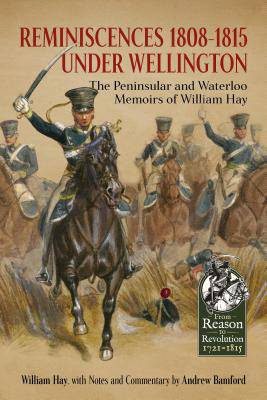
- Afhalen na 1 uur in een winkel met voorraad
- Gratis thuislevering in België vanaf € 30
- Ruim aanbod met 7 miljoen producten
- Afhalen na 1 uur in een winkel met voorraad
- Gratis thuislevering in België vanaf € 30
- Ruim aanbod met 7 miljoen producten
Zoeken
Reminiscences 1808-1815 Under Wellington
The Peninsular and Waterloo Memoirs of William Hay
William Hay
€ 34,95
+ 69 punten
Omschrijving
William Hay had a varied and exciting military career during the later years of the Napoleonic Wars, which took him to the Peninsula, to Waterloo, and, after 1815, to Canada. Graduating from the Royal Military College at Marlow, of which he begins his memoirs with a rare account, he was first commissioned into the crack 52nd Light Infantry and served with that regiment in the campaigns of 1810 and 1811. Promotion then took him into the 12th Light Dragoons and, after a spell at home due to illness, he joined his new regiment in the field just as Wellington's army began its retreat from Burgos. Thereafter, Hay served with the 12th for the remainder of the Peninsular War and again during the Waterloo campaign. A well-connected young man, he spent some of his time away from the regiment on staff duties, serving as an aide to Lord Dalhousie in the Peninsula and later to the same officer again during his tenure as Governor General of British North America.
Hay's recollections are very much those of a dashing young officer, and, if not quite rivalling Marbot for imagination, there is no denying that he is the hero of his own epic. But these are more than just tales of derring-do, for Hay's stories of the lighter side of military life do much to illuminate the character and attitudes of Britain's Napoleonic officer corps. There is also no question but that Hay was a competent and effective officer who did good service in a number of important campaigns, and an old soldier's tendency to polish his recollections should take nothing from that. However, in order to help the reader better judge when Hay is remembering events with advantage, this edition of his memoirs is introduced and annotated by historian Andrew Bamford and includes additional information to identify places, people, and events and to otherwise add context to the original narrative.
Hay's recollections are very much those of a dashing young officer, and, if not quite rivalling Marbot for imagination, there is no denying that he is the hero of his own epic. But these are more than just tales of derring-do, for Hay's stories of the lighter side of military life do much to illuminate the character and attitudes of Britain's Napoleonic officer corps. There is also no question but that Hay was a competent and effective officer who did good service in a number of important campaigns, and an old soldier's tendency to polish his recollections should take nothing from that. However, in order to help the reader better judge when Hay is remembering events with advantage, this edition of his memoirs is introduced and annotated by historian Andrew Bamford and includes additional information to identify places, people, and events and to otherwise add context to the original narrative.
Specificaties
Betrokkenen
- Auteur(s):
- Uitgeverij:
Inhoud
- Aantal bladzijden:
- 168
- Taal:
- Engels
- Reeks:
Eigenschappen
- Productcode (EAN):
- 9781911512325
- Verschijningsdatum:
- 12/06/2017
- Uitvoering:
- Hardcover
- Formaat:
- Genaaid
- Afmetingen:
- 152 mm x 235 mm
- Gewicht:
- 544 g

Alleen bij Standaard Boekhandel
+ 69 punten op je klantenkaart van Standaard Boekhandel
Beoordelingen
We publiceren alleen reviews die voldoen aan de voorwaarden voor reviews. Bekijk onze voorwaarden voor reviews.











